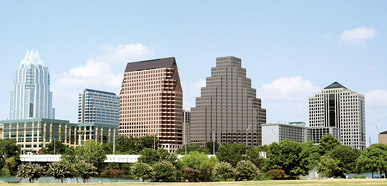Austin, Texas, Distinguishes Itself on Area Development's 100 Leading Locations
As the capital of the Lone Star State - itself well known for its business-friendly policies - Austin stands out. For companies large and small, the metro area has been a sound choice for expansions and re-locations. And its businesses consistently push boundaries, creating high-tech and cutting-edge innovations that in turn spur even more investment.
Spring 2011

"This investment, along with the creation of Samsung Austin Semiconductor's first research and development entity this spring, makes the Austin campus a true semiconductor complex and ensures Austin's premier status as a center for semiconductor research and manufacturing," said Dr. W. S. Han, SAS president.
Austin's robust tech work force will fulfill these jobs. According to the Census, the area has the sixth most educated work force in the nation. Porter says its highly educated potential employees are the top reason companies choose to relocate and grow in Austin. Many workers filter into the city's labor pool via the University of Texas at Austin, the state university system's flagship school, which has more than 48,000 students.
While Austin leads today, success didn't happen overnight. The chamber developed Opportunity Austin, a strategic plan to diversify the area's economy, in 2004 after the 2000-2002 tech bust, which impacted Austin's software and semiconductor businesses. Focusing on attracting clean energy companies, life science firms, creative media, and niche headquarters has strengthened Austin's economy. For instance, Hanger Orthopedics moved its headquarters to the city last year, bringing 280 jobs with it. "That's the perfect fit we're looking for," Porter says.
Today, industry group BioAustin represents approximately 100 life sciences companies that employ more than 7,000 people in Austin and central Texas. These businesses span fields from medical device manufacturing to agricultural biology.
Aggressive incentives and business-friendly taxes are just two more reasons why companies locate here. State business taxes are relatively low and local incentives range from tax abatement to public utility incentives and foreign trade zones.
But one of the single most important strategies Austin has implemented is encouraging local CEOs to talk to other executives about the benefits of relocating to the area.
"It's not brain surgery," Porter says. "It just comes down to building relationships."
Looking forward, the chamber is working on the second phase of Opportunity Austin, a five-year plan that runs from 2009-2013. The goal is to attract 117,000 net new jobs that represent a nearly $11 billion wage increase. Based on its success over the past decade, Austin is poised to continue its economic ascent.
100 Leading Locations
- Desirable Places for Doing Business
- Full Report
- Austin, Texas, Distinguishes Itself on Area Development's 100 Leading Locations
- Southwest Metro Areas
- Southern States Metro Areas
- South Atlantic States Metro Areas
- Plains States Metro Areas
- Pacific States Metro Areas
- Mountain States Metro Areas
- Midwest Metro Areas
- Mid-Atlantic and New England Metro Areas
- Analysis: Listing the Lists - Perception Versus Reality
Joel Kotkin and Mark Schill - NewGeography.com - Analysis: Despite a Reputation as Business Unfriendly, Southwestern Pennsylvania is Booming
Jim Russell - Burgh Diaspora - Analysis: Highly Skilled Workforce, Incubators Accelerate NYC Tech Scene
Richard K. Wallace - The Next Silicon Valley
Most Read
-
-
First Person: Filter King’s Expansion Playbook
Q3 2025
-
Rethinking Auto Site Strategy in the Age of Tariffs and Powertrain Shifts
Q3 2025
-
Lead with Facts, Land the Deal
Q3 2025
-
How Canada Stays Competitive
Q3 2025
-
America’s Aerospace Reboot
Q3 2025
-
The Permit Puzzle and the Path to Groundbreaking
Q3 2025